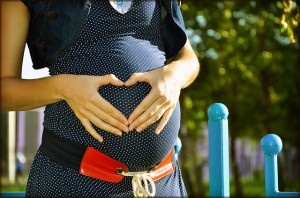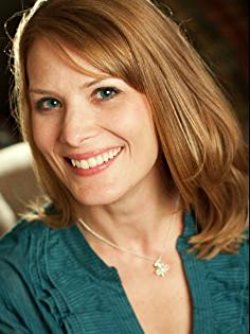- Calls to this hotline are currently being directed to Within Health or Eating Disorder Solutions
- Representatives are standing by 24/7 to help answer your questions
- All calls are confidential and HIPAA compliant
- There is no obligation or cost to call
- Eating Disorder Hope does not receive any commissions or fees dependent upon which provider you select
- Additional treatment providers are located on our directory or samhsa.gov
EDH Weekly Hope – Jena Margis – Pregnancy & Motherhood in ED Recovery

Weekly Hope is a Facebook Live interview series with Kirsten Haglund. It airs on Wednesdays on the Eating Disorder Hope Facebook Page. The interviews with our guests cover a wide array of various topics that relate to eating disorders and mental health. The guests include leading doctors, clinicians, experts, advocates, and people with their own recovery experiences, offering their insight and sharing their wisdom.
This discussion was held on November 28, 2018, the day before Thanksgiving.
Kirsten: I’d like to introduce our guest for today, Jena Morrow Margis, who is the alumni coordinator as well as the general inspiration warrior at Timberline Knolls Residential Treatment Center in Chicago, Illinois.
Hi Jena! Great to have you with us. First of all, can you tell us a little bit about what you do at Timberline Knolls?
Jena: Hi Kirsten! Amazing to be here. So, I have the coolest job on campus. I maintain contact with everyone who enrolled with us as a patient and then departed upon the conclusion of their treatment. I never have to say goodbye to anyone who got discharged and maintain a connection with them as they move on to the next step in their recovery and life.
It is not ongoing treatment but just an extended relationship and connection where we offer events for our alumni and ongoing support through our social media platforms. Sometimes it means facilitating a return to treatment. I aim to keep all these processes as seamless as possible.
This job is amazing and a joy because I get to witness all the milestones of each patient and all the exciting prospects that open up post-treatment. I know so many of the TK alumni and love them all.
Kirsten: Jena is actually a second-time guest on our show. I also want to give a shout out to your facebook page. For all of you watching us right now, if you’re not friends with Jena on facebook, you need to be because Jena has one of the greatest senses of humor. Her posts are hilarious, yet they all touch upon her own present journey through pregnancy.
This brings me to our topic of discussion today. We want to talk about motherhood and pregnancy and how to navigate this tremendous experience of life when someone is in recovery from an eating disorder, has struggled with one in their past or is currently in the middle of dealing with an eating disorder.
This is not talked about often enough, primarily due to the associated stigma, guilt, and shame surrounding this conversation. So, let’s begin with you telling us a little about your family.
Jena: My son will be 17 by the time my daughter will be born. My son was born from my first husband, and my daughter is being born with my now forever husband, Tim. It will be a transition for my son, Jayden, as it will be a new role for him from no longer being the only child. All three of us are super excited.
Kirsten: That’s amazing. Could you share with us your personal experience with how your second pregnancy has been? How can I be there for my pregnant friends during this beautiful journey of theirs, and how can I support them? Also, if they have had an eating disorder in the past, how much more difficult can it be for them and about what other elements do we need to be sensitive?
The last time you were with us, you so beautifully shared your story of recovery from an eating disorder years ago. Now, you are embarking upon this journey being in recovery. How is it different?

It truly is humbling as a woman, knowing that you worked tremendously hard all these years in making a “peace” of sorts with the body you’re living in, and then, in just a moment, you feel you are living in a different one. It is definitely challenging to say the least.
I believe you simply just have to laugh sometimes. Every day and in every moment of every day, I have a choice regarding how I am going to respond to the changes happening in my body.
Even more importantly, I’ve had to learn that it is perfectly okay to respond in two completely different ways at the same time. As women, we tend to be complicated with our emotions.
We never really feel one way throughout the day and adding hormones into that mix means you need to kind of learn to ride the wave. It is what it is.
I spent the first several months of pregnancy shaming myself for feeling the way I did. I felt horrible that I wanted this for 16 years and now that I have it, I was struggling and kept questioning myself for doing so. I eventually just had to come to a place of allowing myself to be exactly where I was which let me experience incredible joy and excitement.
You work hard to finally accept your body, and then you almost have to relearn some of these things, almost as if the training wheels are taken off and then once the baby arrives, you are in a different body once again. At the same time, it is a privilege being a woman, given our ever-evolving nature, and I am looking forward to the rest of it.
Weekly Hope is a Facebook Live interview series with Kirsten Haglund. It airs on Wednesdays on the Eating Disorder Hope Facebook Page. The interviews with our guests cover a wide array of various topics that relate to eating disorders and mental health. The guests include leading doctors, clinicians, experts, advocates, and people with their own recovery experiences, offering their insight and sharing their wisdom.
This discussion was held on November 28, 2018, the day before Thanksgiving.
Kirsten: I’m so excited and so happy for you. The public commentary that pregnant women have to deal with can be pretty invasive, especially for women who have struggled with body image issues.
It may not just be the comments from the people you know or don’t know, but also these added expectations enforced by media and advertising about whether you are gaining too much weight or too little. This can also include doctors who have no knowledge or experience of eating disorders.
Since these comments can be quite triggering, what kind of tips or insight can you provide to women who are struggling?
Jena: It is true that we live in a society where women’s bodies are apparently up for general commentary regardless of any particular situation. However, when you’re pregnant, people somehow believe they can take their filters off.
From my own experiences, what I’ve learned is that first of all we need to give people grace because I have yet to come across a malicious individual who was actually looking to hurt me with their words. I do believe that it is primarily out of ignorance that they come off the way they do. I do not have the power to change anyone, but I do have control over how I choose to respond to things that are said to me.
I am continually reminding myself to focus more on a person’s heart than their words and pause before I react to a comment like “oh my god, you’re so big!” I choose to pick my battles as most people are only meaning to share their excitement with me and I transform such a situation into a teachable moment of sorts.
You really must differentiate between comments that are hurtful from a loved one and individuals you just run into in the general public. If let’s say my husband was to say something hurtful about my appearance, I can choose to have a frank conversation with him to let him know how his words made me feel.
However, if it is a receptionist or someone who makes a passing comment, I’m just going to smile, nod, say thank you and move on.
This does, however, take me back to something I talked about the last time I was on the Eating Disorder Hope Facebook Live Show . It is highly important walking out of recovery to explicitly differentiate our trusted ones who we have given the right to be in our lives, who we listen to and whose opinions mean something to us.
These are the people you can vent your frustrations to about such unpleasant incidences because it will stay with people who love you and in whom you trust. Ultimately, the only person you can change in this world is you, and that’s upon who you need to focus.
Going back to how you mentioned about having trusted healthcare providers, I am presently working with a great midwife who is really supportive of all the changes my mind and body is going through. I am 41 right now, and by the time I deliver my baby girl, I will be 42. So, I am geriatric. Having her work with me has made me realize even more so that how important it is to have a thoughtful and sensitive provider.
I am also on a couple of birth boards, and unfortunately, I do come across a lot of horror stories from people whose doctors are outrageously insensitive, unnecessarily focused on weight to a point where it is genuinely out of balance and borderline body shaming.
My response to such things is always that you do not have to work with such providers if you feel unsafe with them and believe that you cannot trust or be honest with them, then move on and find somebody else.

The first time I weighed, I weighed backwards. And, the nurse’s reaction to it was all on me as I didn’t educate her about my concerns.
I did not want to experience that again. So, I wrote it down for them next time to let me weigh backwards and not let me know the number unless there was a significant problem or trend that needed my attention right away. They have kept it in mind ever since and made sure I am comfortable through the process.
It was important for me to have them on the same page and for me and my provider to be on the same team. Sometimes all it takes is a little bit of responsibility on our part to take the initiative for our own benefit.
Kirsten: These were some great tips, and I hope anyone watching who is or went through a similar experience can take away something useful from this conversation and use it to empower themselves as the primary decision makers of their health care.
Weekly Hope is a Facebook Live interview series with Kirsten Haglund. It airs on Wednesdays on the Eating Disorder Hope Facebook Page. The interviews with our guests cover a wide array of various topics that relate to eating disorders and mental health. The guests include leading doctors, clinicians, experts, advocates, and people with their own recovery experiences, offering their insight and sharing their wisdom.
This discussion was held on November 28, 2018, the day before Thanksgiving.
Kirsten: So, Jenna I’m curious to know how you feel the mommy culture has evolved in the last 17 years. There is so much more information out there now regarding what to do and what not to do that it does seem rather overwhelming. Do you think with the internet and social media there has there been a real drastic change?
Jena: Social media has, I feel, birthed a group of mothers who may have created a completely fake, unrealistic and highly destructive image of motherhood. However, again, that has a lot to do with us and what we allow ourselves to get exposed to and then repeatedly expose ourselves to it.
At the same time, you can do a lot of good through this influence as well as we are aiming to accomplish at the moment. Other than my Facebook page, I’m still rather limited in my social media influence.
I am, however, a little more exposed in terms of discussion and birth boards, and it has been kind of amazing. I have witnessed people use it for the larger good and build people up by supporting one another.
The tricky thing in all of the current mommy culture is the acceptance of different kinds of parenting styles. It is difficult staying true to yourself, mothering your children the way you feel fit and blocking out all the extra noise.
I have witnessed someone who was shamed for being terrified at the time of birth and wanting to ask for elective c-section. I see women being shamed for breastfeeding and not breastfeeding and for co-sleeping and not co-sleeping.
In this rampant culture of shaming that has penetrated our parenting styles, I feel the only way we can survive this, not just on social media platforms but in the real world as well, is to find our tribe, our most loved ones who support us, allow us to be who we are and let us make decisions that we feel are right for our children and us.
We need to consciously choose to not submerge ourselves in it because I feel there is almost something addictive about shaming. Every time you find yourself in a toxic environment, instead of tearing yourself away from that, you keep finding yourself getting looped in for one reason or another.
Hence, I say there is some level of personal responsibility here and exactly why it is essential to recognize your tribe. It doesn’t have to be a lot of people. I have a very small circle whom I love and trust, and it is also my comfort zone.
Regardless of what you may be going through, it is essential to have this safety net of close friends that you can reach out to in all honesty and vulnerability, knowing that you have unconditional support.
Kirsten: So, moving on Jena, how can we help support pregnant women who have recovered? Also, given the very high risk and real threats of relapse in the face of challenging times, hormones and anxiety, what do you suggest would be some effective ways to prevent these women from relapsing back into an eating disorder?
Jena: I think one of the first things is to make this a topic of conversation or at least a topic of awareness, especially with your care providers and close circle of friends and family. During struggling times when you are trying to avoid your problems and vulnerability, continually forcing yourself to feel happy and convincing yourself that this struggle is behind you, it becomes a common tendency.
However, what we underestimate is how much an eating disorder thrives upon secrecy and shame.
Admitting it to our close ones or giving them a heads up that it’s going to be a precarious time for you in your recovery and to be there for you in case you reach out, is a more proactive approach then succumbing to paranoia.
I did the same during this pregnancy by letting my midwife and her nurses know about my history and remind them of the associated complications. I wanted them to know who I am, what I have dealt with and what exactly I needed.
Unfortunately, a lot of women are afraid and ashamed of their eating disorder and body image histories. I did recently read something like only two percent of women who are pregnant with a history of an eating disorder ever disclose it to their providers. That means that providers are left in the dark and these women are unable to access the kind of care they really need.
So it’s just important to make sure that we are not hiding anything from our providers. It is just one of those things where an ounce of prevention is worth a pound of cure, and we can be preventative just by disclosing our histories early on and making it a part of the conversation.
Weekly Hope is a Facebook Live interview series with Kirsten Haglund. It airs on Wednesdays on the Eating Disorder Hope Facebook Page. The interviews with our guests cover a wide array of various topics that relate to eating disorders and mental health. The guests include leading doctors, clinicians, experts, advocates, and people with their own recovery experiences, offering their insight and sharing their wisdom.
This discussion was held on November 28, 2018, the day before Thanksgiving.
Kirsten: We want to make sure we provide our audience with some useful resources. Jena, both you and I have been through this battle before and fully realize as to how much more is there about eating disorders that runs so much deeper than body image and weight control behaviors: it is about identity and self-worth.
For young moms, it is about the significance and who may also be struggling with postpartum depression or moms who are juggling younger children or moms at any stage who are struggling with who they are at that moment and what they want out of life. Just dealing with a newborn who eats, poops and sleeps all day can be challenging in itself and make one feel so alone.
So Jena, to these women in particular, what would you suggest they can do and what encouragement can you give them? This is something you have personally experienced yourself, so your insight here would be highly valuable.
Jena: Absolutely! I’m glad you mentioned as to how incredibly isolating this experience can be in the very beginning. For instance, upon the death of a closed one, the first six weeks are highly chaotic as everyone flocks over to be around you, lend their support and bring over food based upon this strange collective perception that by the sixth week you must be getting over it and you’re just left alone. Unfortunately, it is around that time when people usually crash.
Pregnancy presents a very similar scenario. The celebrations begin before the baby has even arrived: there are baby showers and gifts and then people coming over to see the baby, when you probably do not want them to and from that moment onwards, the new mother is left on her own. She is given all this time to herself when all she really needs is someone to talk to or support her in one way or another.
I feel this in itself can be the biggest tip for those of you who have a new mother in your lives and even when the newness and excitement begins to wain for you, she is still a mom with a new baby, trying to work it out and needing support the entire time, or just companionship.
Yet, this again comes back to us to where we need to sometimes take the initiative ourselves and make people around us aware of our need to reach out. It can be something as simple as texting someone like ‘hey, I really miss adult conversation right now!’
Continue to invite people over that you know and with whom you are comfortable. Once your baby is a little older, ask another mom-friend to go on stroller runs or find your meet-up-spot and just hang out with your kids.

I am talking more on the lines of intellectual stimulation, being with friends that are on the same page as you psychologically, spiritually and socially. Hence, it’s almost like maintaining an aspect of self-care, and it can look different for everyone.
Ultimately, what’s important is that you prioritize yourself as a person, take some time out for yourself and then return to your kids rejuvenated and more present than before. Not chaining yourself entirely to your children, I think that’s a game changer.
Weekly Hope is a Facebook Live interview series with Kirsten Haglund. It airs on Wednesdays on the Eating Disorder Hope Facebook Page. The interviews with our guests cover a wide array of various topics that relate to eating disorders and mental health. The guests include leading doctors, clinicians, experts, advocates, and people with their own recovery experiences, offering their insight and sharing their wisdom.
This discussion was held on November 28, 2018, the day before Thanksgiving.
Kirsten: Absolutely words of gold! So my last question doesn’t actually have much to do with pregnancy or motherhood, but it is the day before Thanksgiving. As I mentioned at the beginning of the interview, it can be quite a challenging time for people dealing with an eating disorder during the holidays.
A huge part of the holidays has to do with food and family which can act as enormous stressors for some people, especially if they are in recovery. What kind of parting words of wisdom can you give for these people going into this holiday season?
Jena: Oh gosh that’s a tricky one, mostly because everyone’s families and their dynamics are so different. I think it’s kind of like the same principles apply here that we discussed earlier regarding going into the day or the season.
One is a sense of humor for all the crazy things that one person or another might say to you. For someone dealing with an eating disorder during the holidays, It is good to have your support system available so you can share these details or simply just vent to them. Where it is essential to give people grace, it is just as important and harder to give grace to yourself.
I specifically remember how Thanksgiving and the holidays used to be a very trying time for me, especially straight out of recovery. I remember the family dinners, and I felt like people were looking at me in the plate instead of looking at me in the face. They wanted to know what I was eating and how much I was eating and how fast or slow I was eating, and at a certain point, I was so done.
The fact that most people just simply do not understand or grasp the gravity of the situation is one of the most frustrating things in the world. Eventually, you have to accept the fact that most people will not understand and you cannot make everyone understand either.
Instead of bracing ourselves for the worst, just go into the holidays and focus on what makes you feel good, be it the family, the gathering, the food or the festivities. Whatever capacity you have for enjoying the food, make the most of it and let all the extra noise slide by.
So, for the person dealing with an eating disorder during the holidays or whatever day you are heading into or whichever family gathering you are going to, your goal needs to be getting through it with a sense of humor and then just being able to move on. It is not always as bad as we make it up in our heads to be.
Usually, these holiday gatherings are a single meal, and that’s one really important factor here that one meal cannot make or break your recovery. Regardless of how ambitious you are about how much you want to eat and indulge and be a recovery warrior, get through it, move on and the next year could be entirely different. Your goal should just be doing the best that you can.
Kirsten: Amen! Jena thank you so so much. It is always so good to have you here on our show and thank you for sharing everything directly from your heart and through your transparency and that wonderful sense of humor of yours. I’m sure everyone here really enjoyed our conversation. Thank you once again and have a wonderful Thanksgiving.

Kirsten: I hope all of you watching who are celebrating Thanksgiving tomorrow, please remember that tomorrow is just one single meal, it’s just one day, and you can do it. As Jena so eloquently put it, keep close to your support system and focus on the bigger picture.
I just want to add that if you need to take a break from people, or family gatherings, then just do so. If you feel the need to step in a silent room, or outside for that matter, it is totally legitimate to take that mental break from all the overstimulation presented from food, conversation, and people.
On this note, I just want to wish you all well and have a wonderful, beautiful Thanksgiving and week ahead.
Source:
Weekly Hope Conversation with Jena Morrow, CADC on November 28, 2018.
Please visit the Weekly Hope with Kirsten Haglund page for other presentations.
About the Author:

Jena is responsible for producing and facilitating various alumnae events, including monthly on-campus gatherings as well as an annual retreat in the Chicago area. She is constantly striving to grow and evolve the alumnae program, which she helped create, and manages an active Alumnae Board and network across the country and world.
In 2010, Jena authored Hollow: An Unpolished Tale (Moody), which chronicles her battle with an eating disorder since her teenage years. In her second book, Hope for the Hollow (Lighthouse Publishing), she offers a practical and relevant devotional guide/journal to gently encourage and inspire women who struggle with themselves and their bodies.
As a national eating disorders awareness advocate and professional speaker, Jena has traveled throughout the country sharing her recovery story and delivering a message of hope and freedom from disordered eating and distorted self-image.
About the Transcript Editor:

Sana graduated with a Bachelors in Economics and Management from the London School of Economics and began a career of research and writing right after. Her recent work has largely been focused upon mental health and addiction recovery.
The opinions and views of our guest contributors are shared to provide a broad perspective of eating disorders. These are not necessarily the views of Eating Disorder Hope, but an effort to offer a discussion of various issues by different concerned individuals.
We at Eating Disorder Hope understand that eating disorders result from a combination of environmental and genetic factors. If you or a loved one are suffering from an eating disorder, please know that there is hope for you, and seek immediate professional help.
Published on April 2, 2019.
Reviewed & Approved on April 2, 2019, by Jacquelyn Ekern MS, LPC
Published on EatingDisorderHope.com

